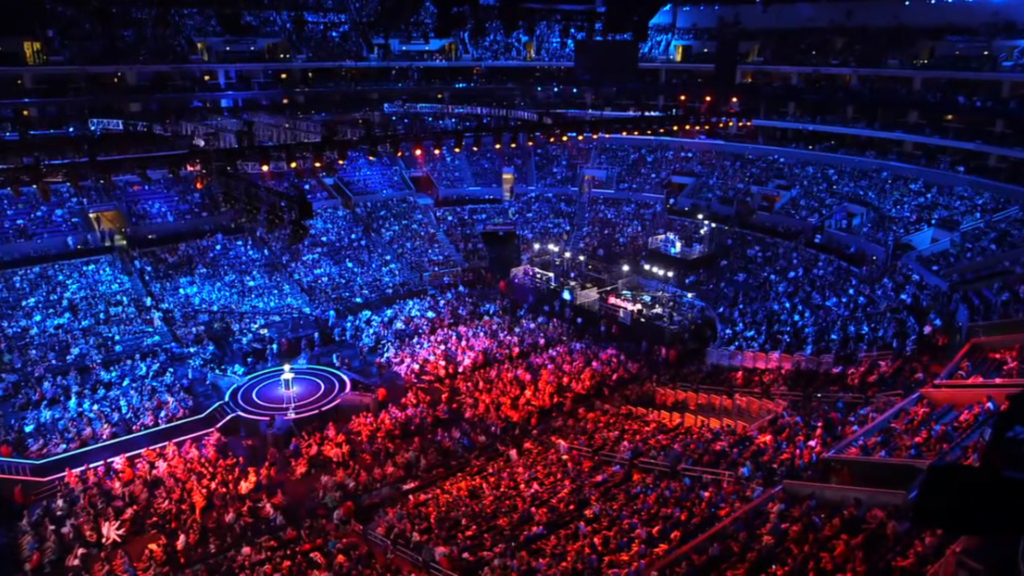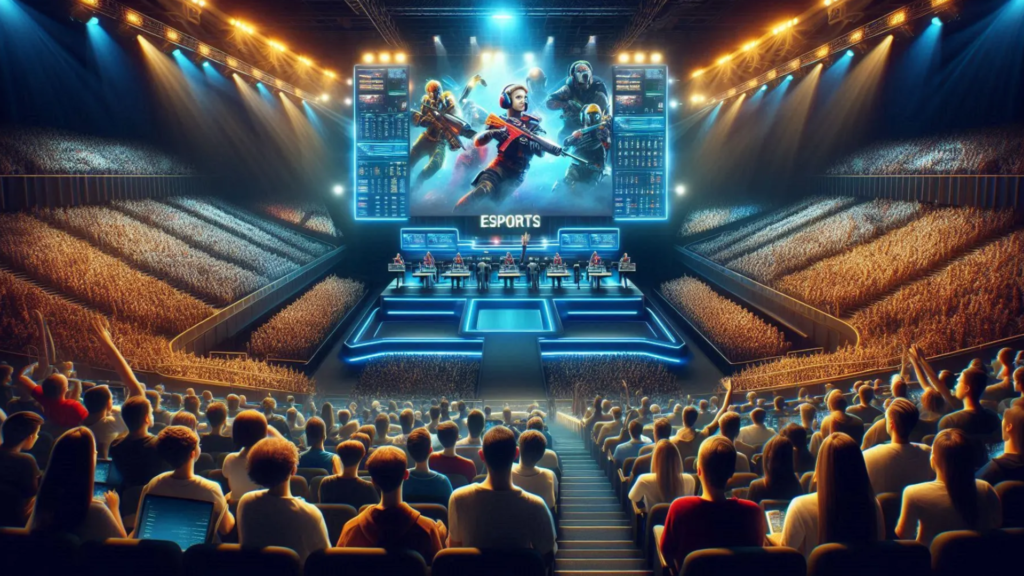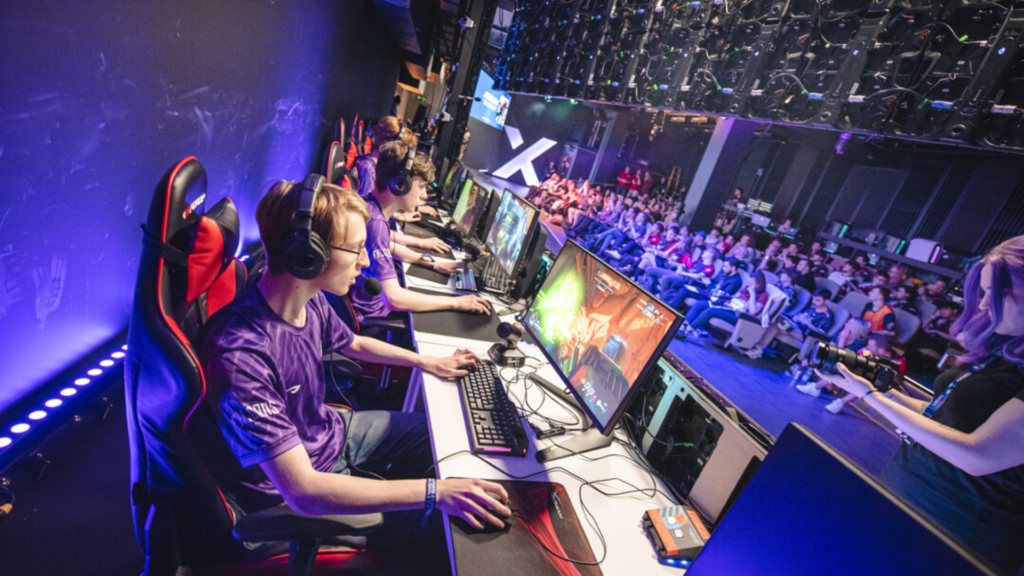Esports, or competitive video gaming, has seen exponential growth in recent years, evolving from a niche hobby into a global entertainment powerhouse. With millions of fans worldwide, massive sponsorship deals, and a rapidly expanding industry, esports are quickly becoming one of the most lucrative and mainstream forms of entertainment. In 2025, esports are no longer just a “fad” but a permanent fixture in the entertainment landscape. But what exactly is driving this rise, and why are esports becoming the next big thing? Let’s break down the key factors contributing to the explosive growth of esports.

1. The Digital Revolution and Global Connectivity
One of the primary reasons esports are thriving is the digital revolution. The widespread availability of high-speed internet, combined with the rise of streaming platforms, has made it easier than ever to access and enjoy esports. Streaming platforms like Twitch, YouTube Gaming, and Facebook Gaming have created a massive online ecosystem for esports, allowing fans to watch their favorite games, players, and tournaments in real time.
Why It Matters:
- Global accessibility: Fans from any corner of the world can tune in to watch live matches or recorded content.
- Online communities: Platforms like Twitch and Discord allow fans to interact, creating a sense of community around specific games or teams.
- 24/7 content: Esports events, streams, and content are available all day, making it easy for fans to stay connected to their favorite games and players.
2. The Rise of Competitive Gaming as a Profession
Esports have gone beyond being a hobby for enthusiasts and transformed into a legitimate career path for gamers. Professional players, coaches, analysts, and content creators are now seen as athletes and influencers in their own right. Major tournaments like The International (Dota 2), League of Legends World Championship, and CS:GO Majors offer multi-million dollar prize pools, drawing top-tier talent and global audiences.
Why It Matters:
- Professional careers: Aspiring gamers now have a viable path to turn their passion for gaming into a career, with opportunities for sponsorships, streaming, and tournament winnings.
- Esports organizations: Teams and leagues, like Cloud9, Fnatic, and Team Liquid, are now household names, attracting fans and creating global fanbases.
- Influencer culture: Popular esports players and streamers like Ninja, Shroud, and Pokimane have millions of followers, further driving the popularity of competitive gaming.

3. Massive Fanbase and Cultural Impact
Esports are no longer just for gamers—they have evolved into a mainstream form of entertainment that attracts a diverse fanbase. Whether it’s fans tuning in to watch League of Legends or Fortnite tournaments or casual viewers watching gaming personalities on YouTube or Twitch, the fanbase is growing rapidly. In fact, esports now rival traditional sports in terms of viewership, engagement, and fan loyalty.
Why It Matters:
- Diverse audiences: Esports attract people from all walks of life, including both avid gamers and casual viewers who enjoy the spectacle of competitive gaming.
- Cultural integration: Esports are increasingly influencing pop culture, with references in movies, TV shows, and even music videos. Brands and celebrities are also jumping on the esports bandwagon, further driving its mainstream appeal.
- Global reach: With international tournaments and cross-border fandoms, esports has created a global fanbase, allowing fans from different countries to unite over a shared passion.
4. Sponsorships and Investment
The financial side of esports has skyrocketed in recent years. Companies from various industries, including tech, fashion, and automotive, are investing in esports as a way to engage with younger, tech-savvy audiences. Major brands such as Coca-Cola, Intel, Red Bull, and Nike have partnered with esports organizations to create sponsorships and merchandise deals, boosting the overall revenue and visibility of the industry.
Why It Matters:
- Big money: Esports now attract major sponsors and investors, providing the financial backing to support teams, tournaments, and infrastructure development.
- Brand collaboration: Sponsors are increasingly using esports to reach younger, more engaged audiences, creating long-term partnerships that benefit both the brands and the esports industry.
- High-value tournaments: With bigger prize pools and sponsorships, esports tournaments are becoming massive spectacles that draw in millions of viewers worldwide.
5. Technology and Innovation in Gameplay
The rapid advancement of gaming technology, including better graphics, faster internet speeds, and more immersive experiences through virtual and augmented reality (VR/AR), has elevated esports to a new level. With platforms like VR esports gaining traction, esports can now offer unique experiences that traditional sports simply can’t.
Why It Matters:
- Enhanced gameplay: With high-resolution graphics and low-latency connections, games like Valorant and Apex Legends are becoming more visually appealing and competitive, enhancing the overall viewing experience.
- Immersive experiences: VR and AR innovations are starting to make their way into the esports scene, adding a new layer of excitement and spectacle to tournaments and gameplay.
- Better infrastructure: The infrastructure around esports, including streaming platforms, live broadcasts, and analytics tools, continues to improve, providing better viewing experiences for fans.

6. The Social Aspect and Community Engagement
Esports thrive on community involvement, and this is one of the driving forces behind their rapid growth. Unlike traditional sports, esports have a highly engaged fanbase that connects through social media, live streams, and fan events. This level of community interaction enhances the entertainment experience, as fans not only watch the games but also discuss strategies, cheer on their favorite players, and share content.
Why It Matters:
- Fan interaction: Fans can engage with players, streamers, and teams directly through social media platforms like Twitter, Instagram, and TikTok, fostering a deeper connection with the community.
- Esports events and conventions: Live events like ESL One and DreamHack bring fans together in person, creating a vibrant atmosphere that fuels the excitement around esports.
- Fan-driven content: Many esports fans create and share content, from fan art to memes, helping to further grow the community and create buzz around tournaments and players.
7. The Integration of Esports into Traditional Media
As esports grow, they are increasingly becoming integrated with traditional media. Major networks like ESPN and TNT have started broadcasting esports tournaments, bringing them to television audiences. Additionally, streaming platforms like Twitch, YouTube Gaming, and Facebook Gaming allow esports content to be easily accessed by fans anywhere in the world.
Why It Matters:
- Mainstream exposure: The inclusion of esports on traditional TV and media outlets helps to legitimize competitive gaming and reach a broader audience.
- Increased accessibility: Fans now have multiple ways to watch their favorite esports events, from live streams to TV broadcasts, making it more accessible than ever before.
- Crossover events: Esports are increasingly featured in major events like the Olympics or the Super Bowl, with gaming tournaments becoming a regular part of the cultural landscape.
Conclusion
Esports are more than just competitive gaming—they’re quickly becoming a cornerstone of global entertainment. With massive viewership, growing sponsorships, technological innovations, and a thriving community, esports are set to take over the entertainment industry in 2025 and beyond. The combination of accessibility, excitement, and community makes esports an attractive option for both casual and dedicated fans, and the industry’s growth shows no signs of slowing down. As the future of entertainment evolves, esports will play a major role in shaping how we experience sports and gaming alike.
For the latest trends and news on esports, visit UrbanOft.
League of Legends World Championship: Official League of Legends World Championship Website.





